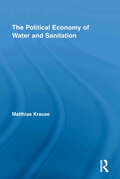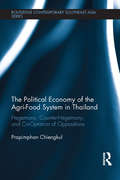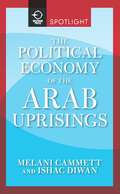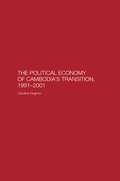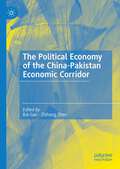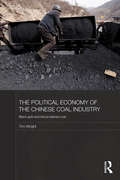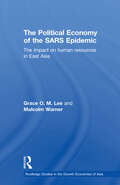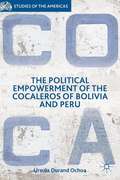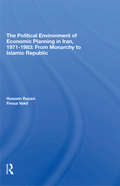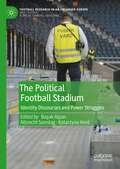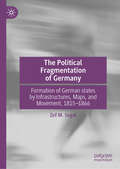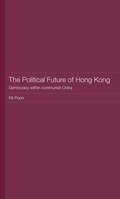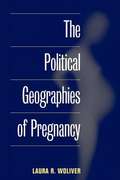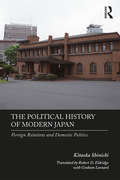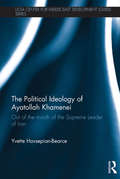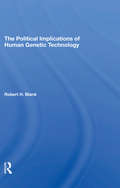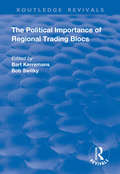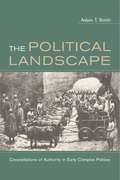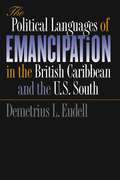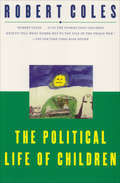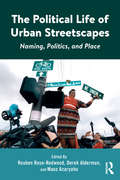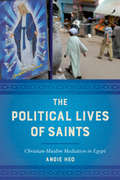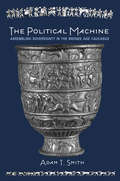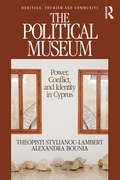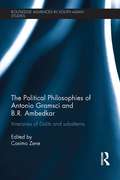- Table View
- List View
The Political Economy of Water and Sanitation (Routledge Studies in Development and Society #Vol. 20)
by Matthias KrauseAccording to recent estimates, around 6,000 people – mostly children under five – die every day from diseases caused by inappropriate water and sanitation (WS) services. Much of the academic and political debate surrounding this issue has focused on private sector participation. By shifting the attention towards the influence of governance, Krause examines the political and sectoral institutions that are essential for the provision of WS services. Utilizing data from sixty-nine developing countries, Matthias Krause demonstrates that the level of democracy has a statistically significant positive impact on access to WS services and that low-quality governance of sub-national governments compromises the internal efficiency of providers and the widespread access to services. This book makes a critical contribution to the water and sanitation research and will help academics and policy-makers to rethink the way in which they deal with water issues.
The Political Economy of the Agri-Food System in Thailand: Hegemony, Counter-Hegemony, and Co-Optation of Oppositions (Routledge Contemporary Southeast Asia Series)
by Prapimphan ChiengkulThe mainstream agri-food system in Thailand has been shaped to aid capital accumulation by domestic and transnational hegemonic forces, and is currently sustained through hegemonic agri-food production-distribution, governance structures and ideational order. However, sustainable agriculture and land reform movements have to certain extents managed to offer alternatives. This book adopts a neo-Marxist and Gramscian approach to studying the political economy of the agricultural and food system in Thailand (1990-2014). The author argues that hegemonic forces have many measures to co-opt dissent into hegemonic structures, and that counter-hegemony should be seen as an ongoing process over a long period of time where predominantly counter-hegemonic forces, constrained by political economic structural conditions, may at times retain some hegemonic elements. Contrary to what some academic studies suggest, the author argues that localist-inspired social movements in Thailand are not insular and anti-globalisation. Instead, they are selective in fostering collaborations and globalisation based on values such as sustainability, fairness and partnership. Providing new perspectives on polarised politics in Thailand, particularly how cross-class alliances can further or frustrate counter-hegemonic movements, the book points to the importance of analysing social movements in relation to established political authority. It will be of interest to academics in the field of Politics and International Relations, Sociology, Development Studies and Asian Studies.
The Political Economy of the Arab Uprisings
by Melani Cammett Ishac DiwanIn this Westview Press Spotlight, Melani Cammett and Ishac Diwan explore the impact of the Arab Spring and subsequent events in the region. The Political Economy of the Arab Uprisings analyzes the ways in which salient socioeconomic and political factors are interacting to shape the construction of new political institutions and economic reform programs. The authors introduce students to events with vivid depictions of regional variations in the uprisings, pointing to a variety of factors that differentiate the countries of the region and help to explain their distinct trajectories thus far.The Political Economy of the Arab Uprisings is an extracted chapter from the 2013 Updated Edition of A Political Economy of the Middle East, Third Edition by Alan Richards, John Waterbury, Melani Cammett, and Ishac Diwan (ISBN 978-0-8133-4928-2). In the full-length edition, the authors present a comprehensive analysis of the transformation and development of the political economy in the Middle East over the past several decades. The book retains its focus on the interaction of economic development processes, state systems, and social actors as well as introduces coverage of the rising oil prices and how it reinforces authoritarian governance in the region, a refined assessment of "the Washington Consensus," the impact of the Arab Spring, and much more.
The Political Economy of the Cambodian Transition
by Caroline HughesCambodia underwent a triple transition in the 1990s: from war to peace, from communism to electoral democracy, and from command economy to free market. This book addresses the political economy of these transitions, examining how the much publicised international intervention to bring peace and democracy to Cambodia was subverted by the poverty of the Cambodian economy and by the state's manipulation of the move to the free market. This analysis of the material basis of obstacles to Cambodia's democratisation suggests that the long-established theoretical link between economy and democracy stands, even in the face of new strategies of international democracy promotion.
The Political Economy of the China-Pakistan Economic Corridor
by Bai Gao Zhihong ZhenThis book explores the political economy of China-Pakistan economic corridor, a major pilot project for China’s “One Belt, One Road” initiatives. Pakistan will provide China with not only a pathway access to the Indian Ocean, Middle East and Africa, but also vital connections to the Trans-Asia railway network that links Southeast Asia, South Asia and West Asia. This book analyzes how domestic factors in Pakistan will affect China’s $46 billion investments. It will be of interest to scholars, policymakers, and journalists.
The Political Economy of the Chinese Coal Industry: Black Gold and Blood-Stained Coal (Routledge Studies on the Chinese Economy)
by Tim WrightCoal mining is one of China’s largest industries, and provides an excellent case study through which to consider the broader issues of China’s transition from socialism to capitalism, focussing on the shift to a market economy, the rise of rural industry and the situation of China’s working class. Coal was one of the pillars of the planned economy but, the author argues, its shift to market-based operations has been protracted and difficult, particularly in moving from the artificially low prices of the planned economy to market prescribed prices - a change that had a major impact on the industry’s financial performance. The book goes on to considers the growth of small rural coal mines as part of the Township and Village Enterprises (TVEs) programme; these small mines have brought prosperity to areas where small manufacturing enterprises are not competitive, but at the same time have been the cause of many social and environmental problems. It also examines the situation of coal miners - arguably one the most vulnerable segments of the Chinese working class - under socialism and under capitalism, paying particular attention to the issue of work safety and coal mine disasters. The book provides a comprehensive and coherent treatment of these issues from the establishment of the People’s Republic up to 2010.
The Political Economy of the SARS Epidemic: The Impact on Human Resources in East Asia (Routledge Studies in the Growth Economies of Asia)
by Grace Lee Malcolm WarnerThis book discusses the political economy of the SARS epidemic and its impact on human resources in East Asia, as it occurred in 2003. The epidemic spread from the People’s Republic of China, to Hong Kong, Singapore and Taiwan, amongst other countries in East Asia and as far away as North America, particularly Canada, the EU and elsewhere. The book looks first at earlier precedents, such as the Black Death and the way in which the potential threats of the recent epidemic were diffused across the world in ‘instant news’ reports; examining why it was dubbed the first ‘global epidemic’ due to its media coverage and how far the threat started a psychological ‘tsunami’ of fear and panic. Next, it examines the anticipated economic consequences arising from this phenomenon and how it affected the business of everyday life, market behaviour and human resources in the Chinese and Overseas Chinese economies. It focuses in particular detail on the cases of the PRC, Hong Kong, Singapore and Taiwan. It concludes with a discussion of the issues involved and lessons to be learnt, and draws conclusions both for theory and practice vis-à-vis future pandemics that may threaten the global economy in the coming decade and the public policy issues involved
The Political Empowerment of the Cocaleros of Bolivia and Peru
by Ursula Durand OchoaThis book offers a comparative analysis of the distinct experiences of the Peruvian and Bolivian cocaleros as political actors. In doing so, it illustrates how coca, an internationally criminalzsed good, affected the path and outcome of cocalero political empowerment in each case.
The Political Environment Of Economic Planning In Iran, 1971-1983: From Monarchy To Islamic Republic
by Hossein Razavi Firouz VakilThe Political Environment of Economic Planning in Iran, 1971-1983: From Monarchy to Islamic Republic Hossein Razavi and Firouz Vakil Based on both research and first-hand experience, this book provides a politico-economic analysis of the operation of Iran's economy before and after the revolution of February 1979. The authors discuss the function and effectiveness of economic planning during the shah's tenure and relate the shortcomings of plan preparation and implementation to the explosive psycho-economic instability of the regime. They then discuss the institutional problems that the revolutionary regime has been facing in operating the economy and foresee the possible consequences of its failure to appropriately deal with these problems. Finally, analyzing the economic postures of important opposition groups, the authors outline future prospects for economic planning in Iran.
The Political Football Stadium: Identity Discourses and Power Struggles (Football Research in an Enlarged Europe)
by Albrecht Sonntag Başak Alpan Katarzyna HerdThis book focuses on the football stadium as a political space and examines how stadiums can be viewed as the objects and catalysts of political change. Rather than acting as functional constructions designed merely to host football games, stadiums stand out in the urban landscape as landmarks that serve as gathering points for large communities.The manifestation of the political in football stadiums can be heard in the discontent voiced by supporter activism; in the use of stadiums for national and local identity politics; in attempts to instrumentalize emotions by both totalitarian and democratic regimes; among fan groups in political uprisings, and in the surveillance of fans through e-tickets and seat allocation.This edited collection brings together a variety of case studies from a wide range of different contexts. Contributors stem from political science, sociology, history, anthropology, human geography and urbanism. As such, the book redefines and broadens what we understand as the political dimension of the football stadium.
The Political Fragmentation of Germany: Formation of German states by Infrastructures, Maps, and Movement, 1815–1866
by Zef M. SegalThis book analyses the development of German territorial states in the nineteenth century through the prism of five Mittelstaaten: Bavaria, Saxony, Hanover, Württemberg, and Baden. It asks how a state becomes a place, and argues that it involves a contested and multi-faceted process, one of slow and uneven progress. The study approaches this question from a new and crucial angle, that of spatiality and public mobility. The issues covered range from the geography of state apparatus, the aesthetics of German cartography and the trajectories of public movement. Challenging the belief that territorial delimitation is primarily a matter of policy and diplomacy, this book reveals that political territories are constructed through daily practices and imagination.
The Political Future of Hong Kong: Democracy within communist China (Routledge Studies on the Chinese Economy)
by Kit PoonOn July 1st, 2007, Hong Kong celebrated the 10th anniversary of its return to the People’s Republic of China, but the past decade has been a bumpy ride for both the Hong Kong people and the central leaders in China. In fact, in 2003 Beijing had already succumbed to public pressure within the fairly short period of its rule by abruptly replacing its handpicked first Chief Executive with a British-groomed civil servant. This book examines the origin and evolution of Hong Kong’s political system, analyses the current contradictions in the system, and discusses how the system might develop in future. It focuses in particular on the office of Chief Executive in the context of Hong Kong’s transformation from a British colony to a Special Administrative Region in China. The dualistic structure of the Chief Executive’s office embodies a dilemma between two competing imperatives – Communist China’s imperative to retain a colonial political system where executive power is concentrated at the top; alongside the need to accommodate new, increasing demands for democratic representation within the territory. The Political Future of Hong Kong demonstrates how the British legacy left its imprint on Hong Kong’s political system. It analyses the strategies adopted by the Sovereign state as it attempted to cope with demands for representative government in the post-handover years, and the strains placed on Hong Kong’s political institutions by the uneasy relationship between central government and local forces of liberal autonomy. Kit Poon examines the possibility of the introduction of universal suffrage for the selection of the Chief Executive, and considers how Hong Kong can secure a democratic future in the context of broader Beijing-Hong Kong relations.
The Political Geographies of Pregnancy
by Laura R. WoliverAs reproductive power finds its way into the hands of medical professionals, lobbyists, and policymakers, the geographies of pregnancy are shifting, and the boundaries need to be redrawn, argues Laura R. Woliver. Across a politically charged backdrop of reproductive issues, Woliver exposes strategies that claim to uphold the best interests of children, families, and women but in reality complicate women's struggles to have control over their own bodies. Utilizing feminist standpoint theory and promoting a feminist ethic of care, Woliver looks at the ways modern reproductive politics are shaped by long-standing debates on abortion and adoption, surrogacy arrangements, new reproductive technologies, medical surveillance, and the mapping of the human genome.
The Political History of Modern Japan: Foreign Relations and Domestic Politics
by Kitaoka ShinichiSpanning the 130-year period between the end of the Tokugawa Era and the end of the Cold War, this book introduces students to the formation, collapse, and rebirth of the modern Japanese state. It demonstrates how, faced with foreign threats, Japan developed a new governing structure to deal with these challenges and in turn gradually shaped its international environment. Had Japan been a self-sufficient power, like the United States, it is unlikely that external relations would have exercised such great control over the nation. And, if it were a smaller country, it may have been completely pressured from the outside and could not have influenced the global stage on its own. For better or worse therefore, this book argues, Japan was neither too large nor too small. Covering the major events, actors, and institutions of Japan’s modern history, the key themes discussed include: Building the Meiji state and Constitution. The establishment of Parliament. The First Sino-Japanese and Russo-Japanese Wars. Party Politics and International Cooperation. The Pacific War. Development of LDP politics. Changes in the international order and the end of the Cold War. This book, written by one of Japan's leading experts on Japan's political history, will be an essential resource for students of Japanese modern history and politics.
The Political Ideology of Ayatollah Khamenei: Out of the Mouth of the Supreme Leader of Iran (UCLA Center for Middle East Development (CMED) series)
by Yvette Hovsepian-BearceAyatollah ʿAli Hosseini Khamenei, Supreme Leader of the Islamic Republic of Iran, is one of the most controversial and influential Muslim leaders in the world today. As Iran’s main decision-maker, his theocratic ideology and decisions carry global consequences. The Political Ideology of Ayatollah Khamenei is the first book to identify and analyze the development and evolution of the theocratic ideology of the Supreme Leader from 1962 to 2014, using his own writings, speeches, and biographies, as well as literature published in the Islamic Republic of Iran. This work provides new insights into Khamenei’s political thought and behavior and their impact on Iran’s domestic, regional, and international policies. Correlating the development of Khamenei’s personality, character, and political behavior with Iran’s internal and external challenges, this study explores key issues of the Middle East region, in particular Iran’s political posture toward Israel, the United States, and the Muslim world, and the diplomatic crises unfolding over Iran’s nuclear development program. This work provides a comprehensive chronological and thematic survey of Khamenei’s life. This book will be of interest to students, scholars, researchers, diplomats, and policymakers focusing on Middle Eastern politics, Iranian affairs, Islamic studies, and international relations; and could serve as an essential resource for those striving to understand Iran’s policies toward Israel, the United States, and the Muslim world, as shaped by its supreme autocrat.
The Political Implications Of Human Genetic Technology
by Robert H. BlankHuman genetic technology has advanced rapidly in recent years to the point where amniocentesis is commonplace and in vitro fertilization has been successful. On the horizon looms the specter of human cloning and genetic engineering, raising a storm of new moral and ethical questions. These questions, asserts the author, are not the only ones to be considered; the impact and role of public policy are equally critical. What part should the state play in human genetic intervention? To what extent does a democratic society have the duty to take steps to reduce genetic disease and improve the quality of life through genetic engineering? If society has such responsibility, at what stage does societal good preempt individual rights? What is society's obligation toward future generations and is genetic manipulation justifiable on these grounds? After surveying the state of the art, the author grapples with these questions, contending that decisions ultimately will not be based on ethical and moral grounds –they will be fought out in the political arena.
The Political Importance of Regional Trading Blocs (Routledge Revivals)
by Bart Kerremans Bob SwitkyThis title was first published in 2000. This text addresses concerns about regional trade agreements. From a variety of political and economic angles, it explains the emergence of trade blocs, their internal policies and politics, and their effects on global trade. It does not provide sequential descriptions and analyses of each of the world's major trading blocs. The focus here is on a number of causal factors that help explain the emergence of trading blocs and the development of their relations to and effects on the multilateral trading system. In each chapter, attempts have been made to draw theoretical and case-based generalizations that may apply to other trade blocs than the used in the empirical analyses.
The Political Landscape: Constellations of Authority in Early Complex Polities
by Adam T. SmithHow do landscapes--defined in the broadest sense to incorporate the physical contours of the built environment, the aesthetics of form, and the imaginative reflections of spatial representations--contribute to the making of politics? Shifting through the archaeological, epigraphic, and artistic remains of early complex societies, this provocative and far-reaching book is the first systematic attempt to explain the links between spatial organization and politics from an anthropological point of view. The Classic-period Maya, the kingdom of Urartu, and the cities of early southern Mesopotamia provide the focal points for this multidimensional account of human polities. Are the cities and villages in which we live and work, the lands that are woven into our senses of cultural and personal identity, and the national territories we occupy merely stages on which historical processes and political rituals are enacted? Or do the forms of buildings and streets, the evocative sensibilities of architecture and vista, the aesthetics of place conjured in art and media constitute political landscapes--broad sets of spatial practices critical to the formation, operation, and overthrow of polities, regimes, and institutions? Smith brings together contemporary theoretical developments from geography and social theory with anthropological perspectives and archaeological data to pursue these questions.
The Political Languages of Emancipation in the British Caribbean and the U.S. South
by Demetrius L. EudellThis comparative study examines the emancipation process in the British Caribbean, particularly Jamaica, during the 1830s and in the United States, particularly South Carolina, during the 1860s. Analyzing the intellectual and ideological foundations of postslavery Anglo-America, Demetrius Eudell explores how former slaves, former slaveholders, and their societies' central governments understood and discussed slavery, emancipation, and the transition between the two.Eudell investigates the public policies--which addressed issues of labor control, access to land, and the general social behaviors of former slaves--used to execute emancipation. In both regions, government-appointed officials (special magistrates in Jamaica and agents of the Freedmen's Bureau in South Carolina) were crucial in implementing these policies. While many former slaves were fighting for the right to be paid for their labor and to own land, many officials came to view their role as part of a new civilizing mission whose goal was to eradicate the psychic damage supposedly caused by slavery. Eudell concludes by examining the 1865 Morant Bay rebellion in Jamaica and the retreat from Reconstruction in South Carolina, part of the larger movement of Redemption that occurred in 1877. Both of these occurrences represented the incomplete victory of emancipation, Eudell argues, and should provoke scholarly questions regarding the persistent thesis of U.S. exceptionalism.
The Political Life of Children
by Robert ColesRobert Coles, one of the most eminent child psychiatrists in the world, spent over a decade researching this book and its companion volume, The Moral Life of Children. Coles visits children all over the world, listening with willing ears, and he captures their thoughts and feelings with remarkable sympathy. As Coles demonstrates in this fascinating work, children learn much more than we think they do about political issues. While we have always taken it for granted that parents teach their children about language, religion, and morality, Coles shows how mothers and fathers also instill a strong understanding of political life in their offspring.
The Political Life of Urban Streetscapes: Naming, Politics, and Place
by Maoz Azaryahu Reuben Rose-Redwood Derek AldermanStreetscapes are part of the taken-for-granted spaces of everyday urban life, yet they are also contested arenas in which struggles over identity, memory, and place shape the social production of urban space. This book examines the role that street naming has played in the political life of urban streetscapes in both historical and contemporary cities. The renaming of streets and remaking of urban commemorative landscapes have long been key strategies that different political regimes have employed to legitimize spatial assertions of sovereign authority, ideological hegemony, and symbolic power. Over the past few decades, a rich body of critical scholarship has explored the politics of urban toponymy, and the present collection brings together the works of geographers, anthropologists, historians, linguists, planners, and political scientists to examine the power of street naming as an urban place-making practice. Covering a wide range of case studies from cities in Europe, North America, Sub-Saharan Africa, and Asia, the contributions to this volume illustrate how the naming of streets has been instrumental to the reshaping of urban spatial imaginaries and the cultural politics of place.
The Political Lives of Saints: Christian-Muslim Mediation in Egypt
by Angie HeoSince the Arab Spring in 2011 and ISIS’s rise in 2014, Egypt’s Copts have attracted attention worldwide as the collateral damage of revolution and as victims of sectarian strife. Countering the din of persecution rhetoric and Islamophobia, The Political Lives of Saints journeys into the quieter corners of divine intercession to consider what martyrs, miracles, and mysteries have to do with the routine challenges faced by Christians and Muslims living together under the modern nation-state. Drawing on years of extensive fieldwork, Angie Heo argues for understanding popular saints as material media that organize social relations between Christians and Muslims in Egypt toward varying political ends. With an ethnographer’s eye for traces of antiquity, she deciphers how long-cherished imaginaries of holiness broker bonds of revolutionary sacrifice, reconfigure national sites of sacred territory, and pose sectarian threats to security and order. A study of tradition and nationhood at their limits, The Political Lives of Saints shows that Coptic Orthodoxy is a core domain of minoritarian regulation and authoritarian rule, powerfully reversing the recurrent thesis of its impending extinction in the Arab Muslim world.
The Political Machine: Assembling Sovereignty in the Bronze Age Caucasus
by Adam T. SmithThe Political Machine investigates the essential role that material culture plays in the practices and maintenance of political sovereignty. Through an archaeological exploration of the Bronze Age Caucasus, Adam Smith demonstrates that beyond assemblies of people, polities are just as importantly assemblages of things--from ballots and bullets to crowns, regalia, and licenses. Smith looks at the ways that these assemblages help to forge cohesive publics, separate sovereigns from a wider social mass, and formalize governance--and he considers how these developments continue to shape politics today.Smith shows that the formation of polities is as much about the process of manufacturing assemblages as it is about disciplining subjects, and that these material objects or "machines" sustain communities, orders, and institutions. The sensibilities, senses, and sentiments connecting people to things enabled political authority during the Bronze Age and fortify political power even in the contemporary world. Smith provides a detailed account of the transformation of communities in the Caucasus, from small-scale early Bronze Age villages committed to egalitarianism, to Late Bronze Age polities predicated on radical inequality, organized violence, and a centralized apparatus of rule. From Bronze Age traditions of mortuary ritual and divination to current controversies over flag pins and Predator drones, The Political Machine sheds new light on how material goods authorize and defend political order.
The Political Museum: Power, Conflict, and Identity in Cyprus (Heritage, Tourism, and Community)
by Alexandra Bounia Theopisti Stylianou-LambertThis engaging volume reveals how politics permeates all facets of museum practice, particularly in regions of political conflict. In these settings, museums can be extraordinarily influential for shaping identity and collective memory and for peace building. Using key Cypriote archaeological, historical, ethnographic, and art museums as examples, this book: provides a multifaceted and deeper understanding of how politics, conflict, national agendas, and individual initiatives can shape museums and their narratives; discusses how these forces contribute to the creation of, and conflict over, national, community and personal identities; examines how museums use inclusion and exclusion in their collections, exhibitions, objects and interpretive material as a way of selectively constructing collective memories. This book will be an important resource for museum professionals, as well as scholars interested in the effects of politics on museums and interpretations of the past.
The Political Philosophies of Antonio Gramsci and B. R. Ambedkar: Itineraries of Dalits and Subalterns (Routledge Advances in South Asian Studies)
by Cosimo ZeneBridging two generations of scholarship on social inequality and modern political forms, this book examines the political philosophies of inclusion of subalterns/Dalits in Gramsci and Ambedkar’s political philosophies. It highlights the full range of Gramsci’s ‘philosophy of praxis’ and presents a more critical appreciation of his thought in the study of South Asian societies. Equally, Ambedkar’s thought and philosophy is put to the forefront and acquires a prominence in the international context. Overcoming geographical, cultural and disciplinary boundaries, the book gives relevance to the subalterns. Following the lead of Gramsci and Ambedkar, the contributors are committed, apart from underscoring the historical roots of subalternity, to uncovering the subalterns’ presence in social, economic, cultural, educational, literary, legal and religious grounds. The book offers a renewed critical approach to Gramsci and Ambedkar and expands on their findings in order to offer a present-day political focus into one of the most crucial themes of contemporary society. This book is of interest to an interdisciplinary audience, including political theory, post-colonial studies, subaltern studies, comparative political philosophy, Dalit studies, cultural studies, South Asian studies and the study of religions.
